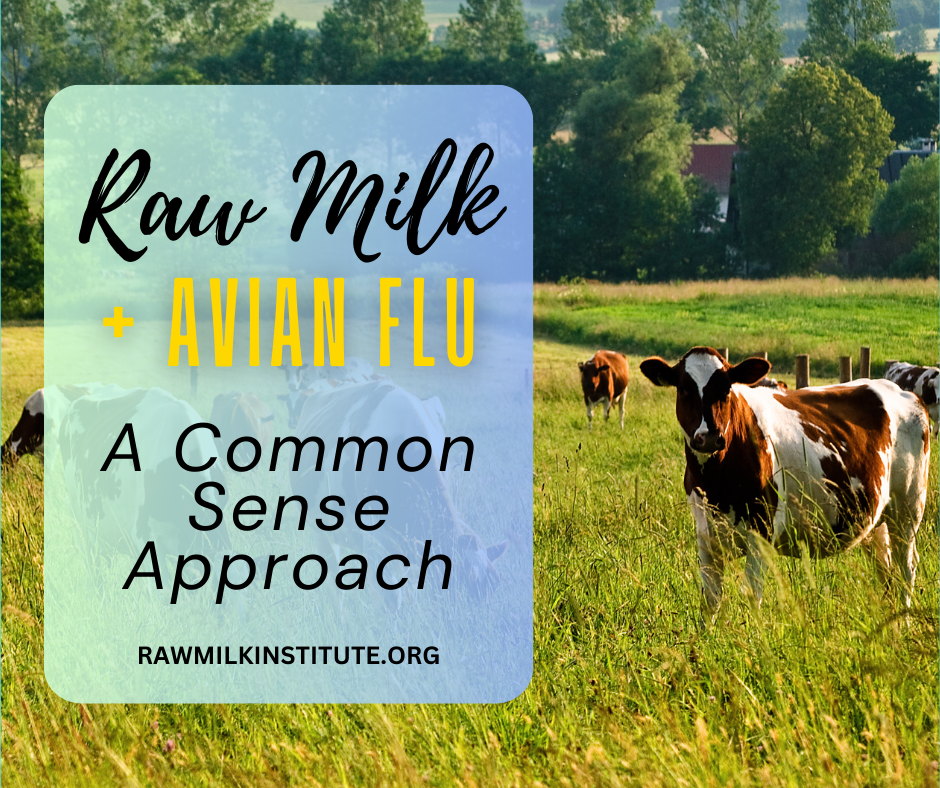Breaking News! There is a concern among dairymen and biosecurity experts about a multistate outbreak of avian flu that is affecting cattle in Texas, Kansas, Michigan, New Mexico, and Idaho. Various Federal and state government agencies are using this cow illness outbreak as a stage to warn consumers against drinking raw milk.
According to the US Department of Agriculture (USDA) Animal and Plant Health Inspection Service (APHIS), in cattle this illness causes decreased lactation and low appetite, but the cattle generally recover without dying. Cows who have contracted this illness have recovered “with little to no associated mortality,” according to the USDA.
The press and media information released by the USDA and others warns against drinking raw milk from affected cows. They further state that pasteurization protects consumers from the illness.
Raw Milk and Breastmilk are Very Similar
As a premed-trained dairy farmer who is a 12-year member of the UC Davis International Milk Genomics Consortium (IMGC), I have studied viral infections in cows and the immunologic and biomechanics of antibody creation. Based on what is known about antibodies and raw milk, there are deep flaws in the warnings about consuming raw milk related to avian flu.
Dr David Dallas PhD is an IMGC researcher who studies milk genomics. At the 2023 IMGC Symposium, Dr Dallas reported that raw milk from cows and goats is “qualitatively similar” to human breast milk. However, “quantitatively” bovine raw milk and human breast milk have “different levels” of various milk components.
This is why raw milk from cows and goats is so well-digested and compatible by human consumers. We can thus compare human mammals with bovine mammals in how mothers protect their babies.
Mammals Protect Their Young Through Antibodies in Raw Milk
In 2004, the state of California Veterinarian visited our dairy to perform tuberculosis testing of our cows. He told me something I will never forget: “Mammals protect their young.”
What he meant was that, in general, when a mother becomes infected by a virus or bacterial infection, she will produce antibodies in her raw milk that will provide her young with protection from the illness. This is part of why breastfed babies are known to have stronger immune systems than babies raised on formula. Antibodies in raw milk are one way that Nature assures the strength and survival of the next generation.
The CDC readily acknowledges that mothers should continue to breastfeed their infants because “flu is not spread to infants through breast milk.” They know that breastmilk contains “antibodies and other immunological factors that can help protect her infant from flu.” Similarly, studies performed at the UC Davis dairy lab during COVID found that exposing a cow to coronavirus resulted in antibodies to coronavirus in her raw milk.
These studies were a further confirmation of what doctors and the owners of Alta Dena dairy knew way back in the 1960’s: cows that have been exposed to illnesses create antibodies to the illnesses which are then passed through their raw milk. Decades ago, Alta Dena dairy would purposely make immune milk for certain consumers and doctors by intentionally exposing cows to specific illnesses. This raw milk was used to help heal sick people. Now the FDA does not allow this practice and threatens anyone who uses it with criminal charges. They consider it to be equivalent to creating a new drug without oversight, which is a crime in the USA under the Food Drug and Cosmetic Act.
Further back in history, it was observed that the milk maidens of the 1700-1800s did not catch smallpox because of their exposure to cowpox by being around dairy animals and drinking raw milk.
Common Sense Approach to Avian Flu in Cattle
The warnings against raw milk related to avian flu are clearly fearmongering. The FDA acknowledges that “there is limited information available about the transmission of bird flu in raw, unpasteurized milk.” Then they go on to use the same fearmongering tactics they’ve been using for decades against raw milk, despite the fact that there is now ample evidence that raw milk can be carefully produced as a low-risk food.
Conscientious raw milk producers already monitor their herds for illness and ensure that raw milk from unhealthy animals is not used for direct human consumption. Additionally, biosecurity measures such as maintaining a closed herd and quarantining any new animals are implemented.
These are common sense measures that are already recommended by the Raw Milk Institute and used by diligent raw milk farmers. We have no reason to suspect that any further measures are necessary in the current Avian flu outbreak in cattle. Mammalian milk is uniquely designed to protect and strengthen the immune system, and those systems will continue on as new threats arise.



